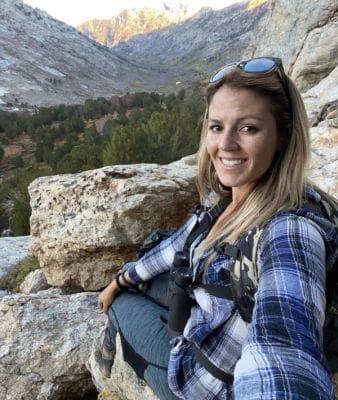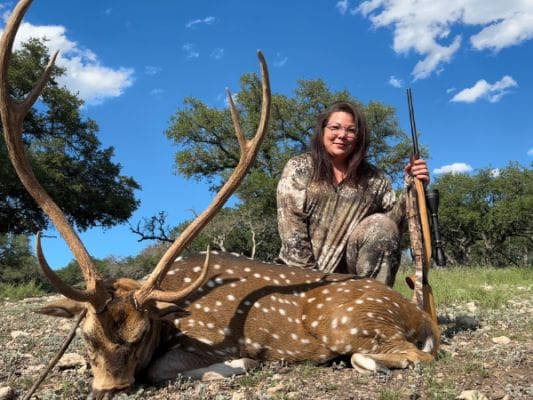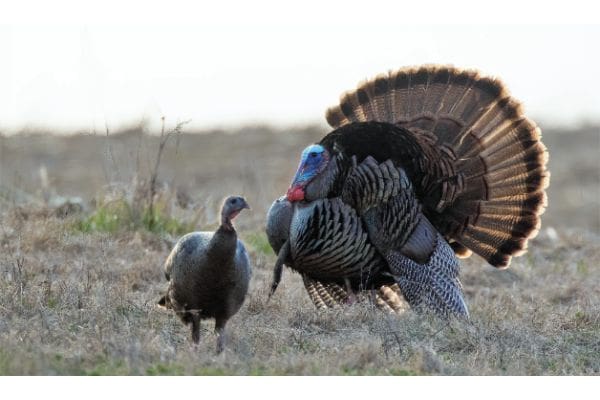EDGEFIELD, S.C. — The National Wild Turkey Federation announces the addition of four new Wildfire Crisis coordinators and a Wildfire Crisis Strategy financial assistant. These new positions will significantly enhance the NWTF’s capacity to support the Wildfire Crisis Strategy across various regions, ensuring more effective management and mitigation of wildfire risks.
“I am very excited to announce that the NWTF has hired four new regional coordinators, as well as a budget specialist,” said Molly Pitts, NWTF Wildfire Crisis manager. “With the filling of these key positions, the NWTF will be able to quickly move forward with helping the USDA Forest Service with the Wildfire Crisis Strategy and getting critical projects done on the ground. Through the hiring process, the NWTF was able to hire quality candidates who have a wide range of experience and expertise. These regional coordinators will be living in the regions they represent and will be able to closely work with our federal partners to add capacity where it is needed.”
The participating agreement, fully funded by federal dollars authorized through the Bipartisan Infrastructure Law and the Inflation Reduction Act, has enabled the NWTF to create these essential positions. With the expanded team, the NWTF aims to build on this momentum and enhance its impact across all covered regions.
Mica Keralis joins as the Wildfire Crisis coordinator for regions 1 and 4, which includes Idaho, Montana, North Dakota, Utah, Nevada, western Wyoming and northwestern South Dakota. Keralis brings a wealth of experience from his 13-year career in the timber industry, holding a master’s degree in forest sciences from Colorado State University and is a certified forester through the Society of American Foresters. He said he envisions a future where western forests are more resilient to wildfires, providing enhanced wildlife habitats for wild turkeys and other wildlife. This resilience will create greater opportunities for outdoor enthusiasts to visit and recreate in and around nearby communities supported by healthy forests.
“One of the most important aspects of my position as Wildfire Crisis coordinator is working with Forest Service personnel on the ground throughout national forests in seven states in the inter-mountain West and Rocky Mountain region of the western U.S.,” Keralis said. “The success of these projects is due to healthy and robust partnerships developed with the personnel across all the national forests. Our efforts align with the NWTF mission to conserve wild turkey habitats and preserve our hunting heritage while reducing catastrophic wildfire risk. All of these efforts align with NWTF’s Four Shared Values by enhancing clean water in our Western forests’ watersheds with habitat conservation and wildfire risk reduction, increasing the resilience of communities within the areas of wildland-urban interface.”
Coralee Ditman will serve as the Wildfire Crisis coordinator for Region 5, covering California. Holding a bachelor’s degree in forest management with a minor in rangeland ecology from the University of Nevada, Reno, Ditman has gained extensive experience in forestry through fostering collaborations with state, federal, tribal and nonprofit agencies. Prior to joining NWTF, Ditman’s roles have led her to hone her skills in fuels reduction, wildland firefighting, fire line resource advising, post-fire restoration and more. She hopes to use these skills to develop, fund and implement large landscape improvement projects and to increase usage of forest products to prevent more saw mills from closing across the nation.
“I’m excited to be part of the much-needed program for Region 5,” Ditman said. “Living in the Sierra Nevada range I am privy to the catastrophic wildfire that has been decimating national forest land. The national master stewardship agreement can and will be a valuable tool for the Forest Service to implement more projects that were once limited by [staffing capacity]. NWTF’s regional Wildfire Crisis team can be a great asset to all national forests within California. My career goals as a Wildfire Crisis coordinator are to implement NWTF core values through partner projects and, in doing so, reduce the risk of wildfire across the landscape.”

Austin Sommerville takes on the role of Wildfire Crisis coordinator for Region 6, which includes Oregon and Washington. Originally from west Texas, Austin earned a B.S. in wildlife biology from Texas Tech University, spending the first 10 years of his career traveling the country as a consultant. Preferring the West, he eventually focused on forestry, joining the NWTF in 2016 as a cooperative forester. Looking forward to his new role, Sommerville envisions being a part of a growing team that is working on a larger scale to meet the persisting need.
“The work we will be doing in the next five to 10 yearsis a small fraction of what needs to be done,” Sommerville said. “My hope is that we establish a public and institutional expectation that wildfire mitigation is not a one-time project to be done at the time of crisis, but an ongoing effort considered as part of living in and around forests. I hope to see a time when forests are healthy and appropriately stocked so that communities can use their resources to improve habitats and forest infrastructure instead of fire suppression.”

Wade Young will serve as the Wildfire Crisis coordinator for Region 8, covering the southern U.S. states, including Texas, Oklahoma, Arkansas, Louisiana, Mississippi, Alabama, Georgia, Florida, Tennessee, Kentucky, South Carolina, North Carolina and Virginia. With a degree in wildlife and fisheries management from the University of Tennessee, he spent 13 years with the Tennessee Wildlife Resources Agency as a wildlife technician and wildlife officer, gaining experience in law enforcement, public outreach and education, and wildlife management projects. In his new role, Young looks forward to the opportunity to be proactive in our projects and getting out in front of potential problems before they occur.
“I hope this role leads to improved forest management and more acres positively impacted throughout my region, as well as nationwide,” Young said. “Having worked in the aftermath of catastrophic wildfires and seeing the loss of life and property firsthand, I look forward to being able to work with our partners at the U.S. Forest Service to promote healthier forests, which will in turn help reduce the risks of catastrophic wildfires and protect our communities and natural resources.”

Rebecca Abfalter has assumed the role of financial assistant, where she will support the Wildfire Crisis Strategy by coordinating financial agreement-related activities with NWTF’s longtime partner, the Forest Service. Abfalter began her career at the NWTF in 2007 as a temp in membership services, and has worked across multiple departments over a decade. She holds a bachelor’s degree in business management with a general management certificate. In her new role, Abfalter is eager to contribute to raising awareness about the importance of land conservation and maintaining our hunting heritage.
“We have an opportunity to spread awareness about high-risk ecosystems and our plans to keep them balanced and resilient,” Abfalter said. “I look forward to watching the Wildfire Crisis Strategy program evolve. It’s a new project, and we’ve built it from the ground up. Our efforts to conserve our lands in this beautiful country have significantly expanded.”

The NWTF also continues its efforts in Region 2, where Brian Russell, Wildfire Crisis coordinator for Colorado, Kansas, Nebraska, and parts of Wyoming and South Dakota, has made significant strides over the past year. His contributions include writing and development of the Colt Timber Transit Pilot Project story map, assisting with the development of the Request for Proposal (RFP) for the Hawks Forest Stewardship Project, and pre-bid tour and reviewing project proposals and assisting with development of agreements in regions 1, 2, 4 and 6. Currently, Russell is working more directly with Region 2 on development of RFPs and coordinating pre-bid tours on the Bighorn National Forest, White River National Forest and San Juan National Forest.
“Our WCS team is fully staffed now, which will be an asset to the NWTF in delivering WCS projects on the ground,” Russell said. “Without this additional staffing, the NWTF would be in a situation where we will have a lot of projects in place without a workforce to manage the projects. The additional team capacity will be an asset to NWTF by increasing pace and scale of forest restoration work under the Wildfire Crisis Strategy and helping maintain current infrastructure in place and grow workforce capacity, which is needed to expedite forest restoration work.”
With the addition of these new positions, the NWTF is poised to significantly bolster its support for the 10-year Wildfire Crisis Strategy, a comprehensive initiative aimed at addressing the most pressing wildfire threats to communities. As wildfire threats continue to rise, the NWTF’s expanded team and strengthened partnership with the USDA Forest Service mark a crucial step forward in addressing the crisis. Through these efforts, the NWTF reaffirms its commitment to safeguarding communities and landscapes from the devastating impacts of wildfires.
Read the full article here




